German
SdKfz 138/2 Jagdpanzer 38(t) Hetzer
In-The-Box Comparison Review for 1/72 scale
By Stephen Brezinski, Dec. 2005
INTRODUCTION
This in-the-box review covers 1/72-scale Hetzer kits released by ESCI,
Attack Hobby and by UM companies in a compare & contrast manner.
The ESCI is a veteran kit from the 1980’s while the UM and Attack
kits are new releases. I make no mention of the fit of the parts or
full clarity of the instructions, as I have not assembled any of these
kits yet. As this review is written I await the delivery of Attack’s
early Hetzer kit so my comments will have to be carefully based of
the similar Attack sIG 33 Hetzer version and photos from Attack Model’s
website. [Comparing the UM and ESCI Hetzers to this Attack model may
not allow a perfect comparison but I feel that with the same suspension
and lower hull they are close enough to know how Attack compares with
ESCI and UM.]
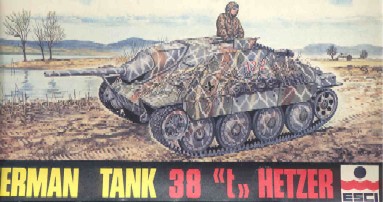
The ESCI kit is a late war Hetzer featuring the wider
gun mantlet, vertical flame-damper exhaust, and hood over the driver’s
visor. So this vehicle can be depicted in the Ardennes and the 1945
closing battles of the Reich. I am not aware of this ESCI model being
re-released by Italeri yet, though I hope and expect it will be.
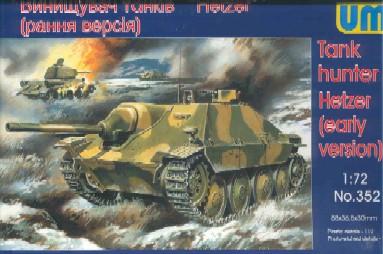
The new Hetzer from UM is of the early production Hetzer
with the early gun mantlet, protruding visor and horizontal exhaust
muffler. This early Hetzer can be modeled serving in France, Poland,
Belgium and Romania in 1944. Parts for the late Hetzer are also included
so both complete versions can be built from this one kit, or leftover
parts can be used to improve the ESCI Hetzer.
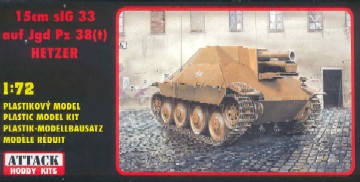
Attack Hobby’s 15-cm sIG 33 Hetzer model depicts a
variant mounting the sIG 33 infantry gun with an open top crew compartment
and designed for infantry support. Only about 25 of these were built
in the last months of WW2. A good description of this variant is covered
in Gary Edmundson’s book Modeling the Jagdpanzer 38(t) Hetzer,
which is listed in the Resources section below.
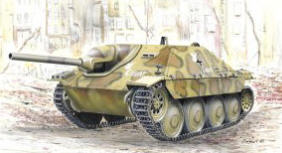
Attack Hobby’s Jagdpanzer 38 Hetzer is also
of the early variant with essentially the same features as the UM
kit, though entirely different tooling and assembly of course.
Brief
History for the Modeler: The Jagdpanzer 38(t) Hetzer was
designed to replace the makeshift, interim open-top Marder tank destroyers
in the German Army of WW2. Production started in April of 1944. In
July 1944, they were issued to Wehrmacht infantry divisions though
by April 1945, over 2500 Hetzers were produced, were widely distributed
and were used to replace tanks in Panzer Divisions.
The Hetzer was a mixed blessing as a tank destroyer: having a good
gun, well sloped armor, and low profile; but having a cramped crew
compartment, very thin side armor of only 20-mm, and very small gun
traverse of 5 degrees left and 11 degrees right. [In comparison the
Marder III had a gun traverse of 30 degrees left and 30 right.] This
limited traverse for the Hetzer’s main gun meant that it was
difficult to follow a target across its field of view. The gun was
a 7.5-cm L48 PaK 39 using the same ammunition as the StuG III, Panzer
IV and StuG IV. (It is termed a Pak [short for Panzerabwehrkanone]
rather than a KwK gun [Kampfwagenkanone] since its purpose was as
an antitank gun & tank destroyer, like the Pak 40 gun.
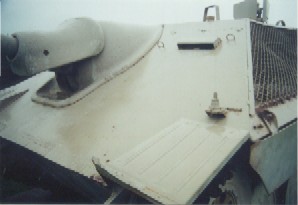
Above is a photo I took in 1999, of the front left side of the Hetzer
on outside display at Aberdeen Proving Grounds in the USA. This is
a very late production Hetzer. Things to note are the late mantlet
with bolt hole on the side, the fender detail, the Notek headlight
post, the hood over the driver’s periscopes, and the side skirt
attachment. Notice how the forward (and trailing) edge of the sideskirts
bend inward to help prevent their snagging on things. On the roof
is visible the guard for the gun sight and the remote control MG34
machine gun mount. Note also that the superstructure side has been
cut off so as to view the now very rusty interior.
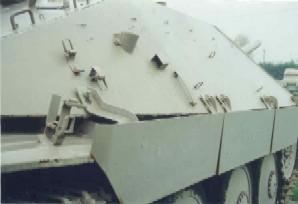
Above is photo of the right-rear of the Aberdeen Hetzer showing the
jack bracket on the fender, the hand tool brackets on the hull side,
the side skirt brackets, and a grab handle and commander’s periscope
location on the rear plate. The space between the fender and the superstructure
above it is the location of the engine air intake. Note also how the
rear edge of the side skirt curves in. [You will note that though
the detail of these Aberdeen Proving Ground displays is good the paint
scheme is wholly inaccurate and the weathering poor. They will never
place at a model show!]
PARTS
COMPARISON
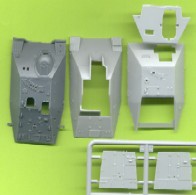
The ESCI Hull Superstructure: Starting at the far left in
the above photo the dark gray ESCI hull is some 15 years or more older
but still stands up great in detail. You may want to replace the grab
handles on the engine deck and periscope guard on the commander’s
hatch with wire and brass strip. The front fender braces are way too
thick. The kit’s handtools are molded separately. ESCI is the
only one of the three to have open crew hatches. No etched brass is
included.
Attack Hobby Hull: In the center Attack’s superstructure
displays the overall dimensions and engine deck. Attack’s dimensions
are pretty close to those of ESCI’s though is a little bit narrower
and shorter. The jack block (a piece of wood that is placed on the
ground under the jack) is molded onto the right front fender where
it’s a separate piece on the ESCI model. Attack’s Hetzer
has no open hatches while the Attack sIG 33 variant has an open top
and some interior parts like transmission and ammunition bins. The
upper superstructure sides in the above scan can be thinned to scale
thickness or replaced with thinner plastic card. No etched brass is
included.
Unimodels (UM) Superstructure at the far left is
the most complex with separate glacis plate part, separate kugellofette
(the cast armor housing for the PaK 39 gun), a choice of early of
late engine decks (parts 37 & 23), separate cast armored housing
for the gun ball mount, and early or late mufflers and driver’s
visors. [It appears there are parts for a choice of both initial &
late model Hetzers in the box. What I cannot understand is why Unimodel
molded the engine panel lines as raised lines rather than recessed
lines like on the rest of their model, and how both ESCI and Attack
do it. Raised panel lines should have become a thing of modeling history
10+ years ago! For a good display model all these raised lines will
need to be carefully scraped off and new lines scribed.
Ed.
Note: it seems that recently (2012) UM has addressed the issue of
the raised panel lines:
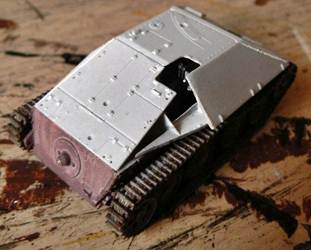
Many thanks to Piotr Pyrczak for bringing this to our attention.
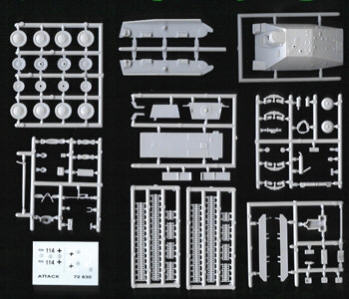
Above is a scan of Attack’s Hetzer sprue that I borrowed from
their website. Though not very clear this gives us a good idea of
the parts included. Fortunately most of the parts are shared by Attack’s
15-cm sIG 33 Hetzer, which I did have for this review.

Gun Mantlet Comparison The exterior gun mantlet from
the darker gray ESCI model (part ) is notably narrower than the two
mantlets in the UM model. Based on my photos the ESCI mantlet just
does not look correct and is too narrow [it may be suitable for a
JgPz 38 Starr variant which has a narrower mantlet, if you chose to
scratchbuild-convert one of these versions.] UM’s two mantlets
(parts 36 & 21) look very good. Three boltholes will need to be
drilled: on the top and each side of the mantle.
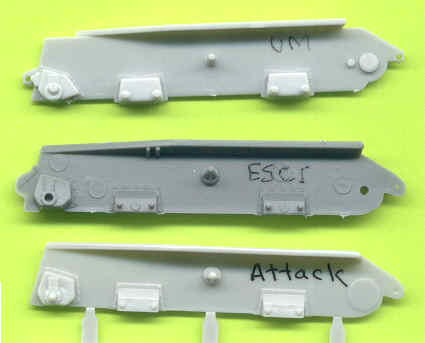
Except for some prominent ejector pin marks, the hull sides from the
old ESCI Hetzer kit in the center appear to have to best detail. Little
of these parts and marks will be visible on an assembled model unless
we are modeling it with a wheel or two missing.
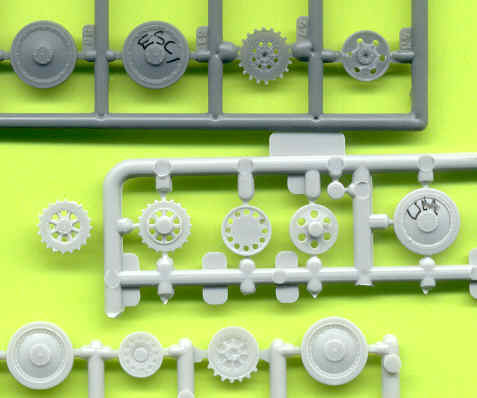
Wheels Comparison. The dark gray ESCI wheels at the
top compare well with the newer UM model. I am aware of about six
variations of idler wheels and ESCI gives us an eight-hole late idler.
Since UM includes parts for both early and late Hetzers both early
12-hole and late 8-hole idler wheels are included. UM impresses me
as having the most accurate and finely molded sprocket. Attack’s
idler & sprockets are well shaped but the holes need to be drilled
out, a very tedious chore. [At least it is fewer holes to drill than
Dragon’s T-34-85 roadwheels.] Etched brass replacement sprocket
wheels and idler wheels are available.
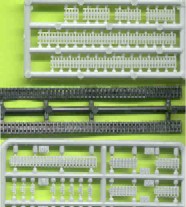
Track Comparison: Attack’s hard plastic tracks
at the top have decent exterior detail but no interior surface detail
and the track guide teeth are just small nubs. Some etched brass frets
include replacement track teeth. These are the same tracks issued
with the company’s Pz 38(t) tank kits. To wrap them around the
idler & sprocket wheels it will help to score the inside surface
of the track length with a razor saw or scriber, which also creates
rudimentary links.
The ESCI stiff polyethylene, rubber-band type tracks in the center
are the least accurate of the three and are so stiff they are hard
to wrap and drape naturally over the wheels. Heating them in very
hot water and bending them around a wood dowel before cooling helps
considerably by making the curves around the idler & sprocket
permanent.
The UM link & length hard styrene tracks, at the bottom of the
scan, are by far the best of the three manufacturer’s. I wish
UM sold these tracks separately to use with the Attack and ESCI kits.
ASSEMBLY
INSTRUCTIONS
ESCI, UM and Attack all give us exploded view drawings for assembly
in 5-steps for the ESCI and the Attack kits and 12-step for the UM
kit. All three directions are adequate and designed for assembly without
written instructions.
KIT
DECAL MARKINGS
All kits come with water slide decal markings. ESCI offered markings
for four different vehicles but give us no information as to the units
and time periods the markings are for. I presume that if Italeri re-releases
this old ESCI model they will correct this deficiency. Attack has
simple cross markings for their sIG 33 Hetzer. Attack’s Panzerjager
Hetzer appears to have markings and painting instructions for two
vehicles. UM included markings and descriptions for three early Hetzer
vehicles with extras (for the late Hetzer release?).
CONCLUSION
All three kits will build into decent Hetzer models but I am surprised
to see that, in my opinion, the old ESCI kit is still the better of
the three [except for the tracks and gun mantle]. Attack Model’s
molding is a little soft, which is common of limited run styrene kits.
Still, Attack gives us a good model and the company offers us vehicles
that I doubt anyone else will offer in plastic. The Unimodel Hetzer
has some great features and particularly has great looking tracks,
I am very disappointed with the raised panel lines on the engine decks.
At this time I know of no etched brass frets for the 1/72 scale Hetzer,
but perhaps soon? My greatest wish were that a manufacturer soon offers
good replacement tracks for the ESCI and Attack models. Replacement
tracks can cover not just a few Hetzer models but a wide span of Pz
38(t) and Marder III kits offered from Attack and ESCI.
This review has no comments on the fit of parts, which will come in
a construction review.
BUILDING
& HISTORICAL REFERENCES
HETZER Jagdpanzer 38(t) and G-13, by Horst
Scheibert, Schiffer Publishing (1990). Good inexpensive softcover
book with WW2 era and contemporary museum detail photos. [The G-13
is the post-war version as used by the Swiss Army.]
Modeling
the Jagdpanzer 38(t) ‘Hetzer’,
by Gary Edmundson, Osprey Modeling #10 (2004). A very good softcover
written for the modelers with up to date information on Hetzer development
and good photos of the progressive assembly and painting of four Hetzer
variants. I find the photos too small unfortunately.
Jagdpanzer
38 ‘Hetzer’ 1944-45, by Hilary Doyle, Tom
Jentz, and Mike Badrocke, Osprey Publishing’s New Vanguard #36
(2001). Another very good book covering development, features and
combat use of the Hetzer. Good photos and color drawings. Doyle and
Jentz are recognized as being among the best authorities on German
AFV’s.
www.attack-hobby-kits.cz
Website for Attack Hobby in the Czech Republic, producers of styrene
& resin kits and accessories.
www.lemaire.happyhost.org/char/complet/451.html#100172
This website is a very helpful online encyclopedia with information
and photos of AFV’s and artillery.
pedg.org/panzer/public/website/hetzer.htm
The Achtung Panzer website of George Parada. Copious amounts of great
information and photos.
www.pzfahrer.net
A website dedicated to the detailed study of Hetzer vehicle, by Richard
Gruetzner: all Hetzer all the time. Hosted @ George Bradford’s
AFV News website. One of the best online sites on the Hetzer.
|











